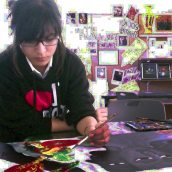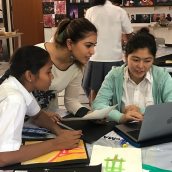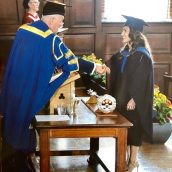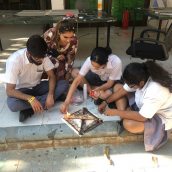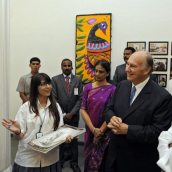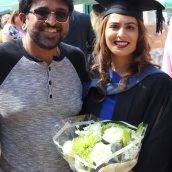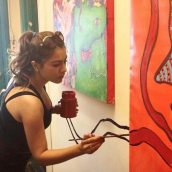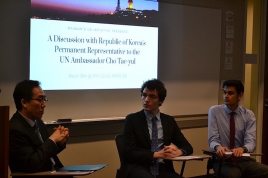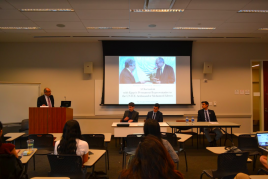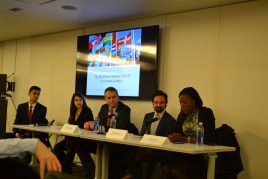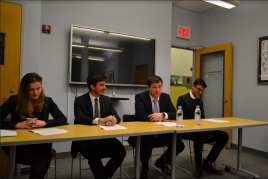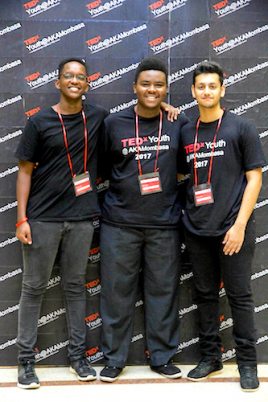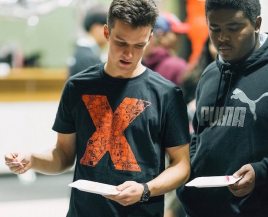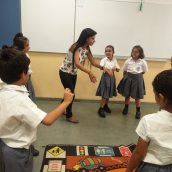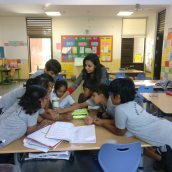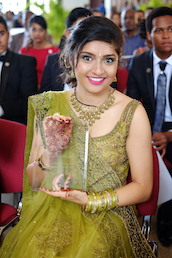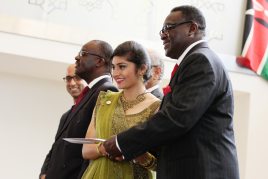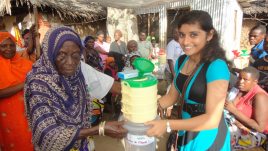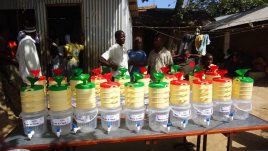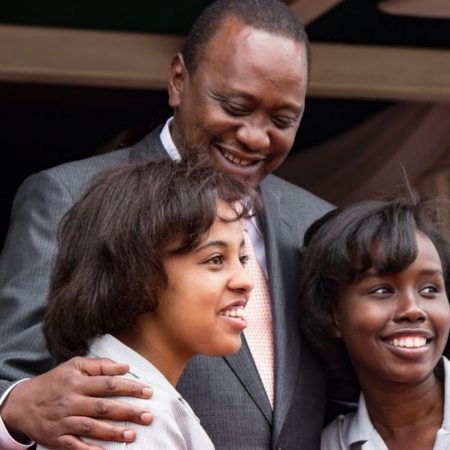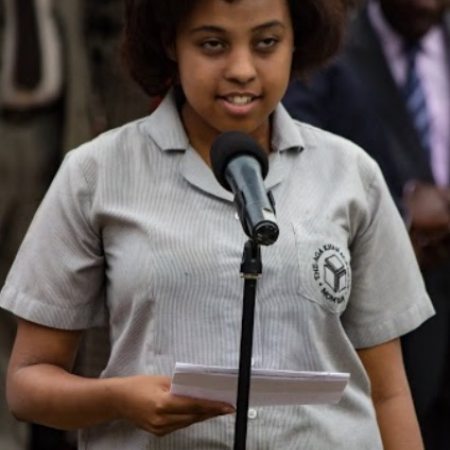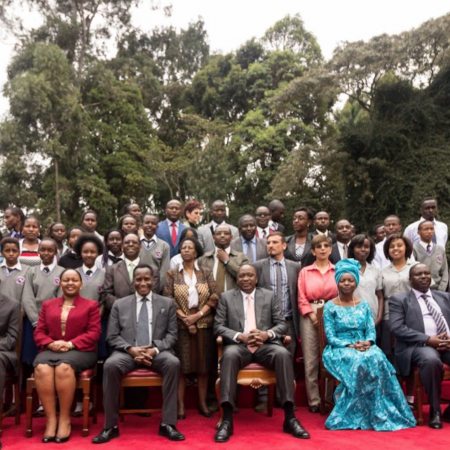Taniya Dharani - alumna returned as visual arts fellow
“The Academy has made me the person I am today,” she says. “I wanted to give back to the Academy what it has given me.” After graduating from the Diploma Programme, Taniya went on to pick up a Bachelor of Arts from the University of Reading, England. In her current role at the Academy, Taniya wants to help visual arts students prepare for university level art courses. It’s also on her agenda to introduce art students to careers in their field that they might not have considered.
“I want to help give our Diploma Programme art students theoretical practice that will be useful at university,” she says. “I also want to help visual art students understand what opportunities the art world outside holds for them; artistic pathways they can opt for including business and law options in sectors that not everyone is aware of.”
Though she has her task laid out in front of her, returning to the Academy in her new role is understandably strange for Taniya. “I still feel like a student at heart,” she says. “But I’ve learnt to act like a teacher and take responsibilities.” Taniya understands that her experience as a student at the Academy puts her in a unique place of understanding in her current role as teacher. “I feel privileged to have the opportunity to see Academy life from a different light this time. Now I understand the day to day challenges teachers face, as well as the hardships of student life.”
Taniya fondly remembers her time as a student at the Academy. When she graduated, Taniya was the only student in the visual arts department. “I really enjoyed visual arts in school. Being the only student, I had the entire art studio and Ms. Meenakshi to myself.” She is referring to Meenakshi Joshi, who is now MYP coordinator in the Senior School. She also remembers history classes with Koel Ray, and service opportunities at old age homes and government schools that taught her humility and empathy.
However, her most cherished memory at the Academy is meeting His Highness the Aga Khan. At the inauguration ceremony of the Academy in 2014, Taniya had the opportunity to show and discuss her art work with HH. “It was the most precious gift that I ever received and a memory that has helped me hold onto my passion.”
In her personal life, Taniya cites her father as her source of inspiration. It is a common trope that parents discourage their children from pursuing a career in the arts, but this wasn’t the case for Taniya. “Despite people not understanding my passion for painting, he [Taniya’s father] always stood by me and helped me achieve my goals,” she says. Taniya is also proud of her father’s efforts in community service and the life he has led. “His struggles and achievements inspire me. It makes me want to do great things.”
“Growing up I realised that the only thing that ignited a fire in me was holding a paintbrush in my hands and dropping paint all over my clothes. It made me feel like all is well in my world, even when almost everything in life was falling apart.” Taniya is in some ways a time capsule from the Academy’s early years, and like a time capsule, she reminds us of things that have changed, and also about the things that have remained the same.
Written by Ajay Sundaram
Raghuveer Vyas (Class of 2016): Advocating for change and development
Raghuveer Vyas graduated from the Aga Khan Academy Mombasa in 2016 with a desire to be a change-maker in our world. Due to his experience at AKA Mombasa, this desire has become a reality.
Raghuveer Vyas, far right, at a UN Initiative event at NYU.“My time at the Academy undoubtedly influenced where I am now,” Raghuveer said. “The Academy's strong emphasis on contributing back to society certainly further influenced my academic choices.”
Raghuveer pursued his undergraduate degree at New York University (NYU) in Global Liberal Studies with a concentration in Politics, Rights & Development. Currently during his final year, Raghuveer was admitted into NYU’s Bachelor of Arts (BA)/Master of Arts (MA) programme.
“Through this programme I hope to graduate with an MA in International Relations by 2021,” Raghuveer said. “I will be concentrating on Sub-Saharan African affairs and peace and conflict resolution in the International Relations programme.”
Since joining NYU, Raghuveer has been a member of the United Nations Initiative at NYU, which was created to increase the dialogue between international leaders and the youth/students who have become disconnected from the global political process. During his final year as an undergraduate, Raghuveer became the director of the Initiative because he believes “the UN Initiative’s mission and actions to be absolutely critical to the political discourse at NYU.” Due to his commitment and passion, Raghuveer said he has made some impressionable strides in the Initiative.
“I personally have worked to increase the participation of the African international leaders, such as the ambassadors of Egypt, Nigeria and the African Union,” Raghuveer said. “I’m also working to expand our panel discussion series, which focuses on thematic issues as opposed to the affairs of nation-states.”
As part of the Global Liberal Studies programme at NYU, students are required to spend a year abroad at one of NYU’s satellite campuses, such as Berlin, which is where Raghuveer decided to go. Through this, Raghuveer discovered his passion for climate change when he started interning with Climate Analytics, an international climate science and policy institution.
Raghuveer Vyas, far right, at at UN Initiative event at NYU between an ambassador from Egypt and NYU students.“I truly began to understand that climate change poses the single largest threat to the human species, and would disproportionately affect lower economic classes and citizens in developing countries, with the African continent poised to be one of the worst hit, “ said Raghuveer.
While in Berlin, Raghuveer worked as part of the climate policy team at Climate Analytics where he conducted scholarly research on the policies surrounding climate change mitigation and adaptation. As part of the team, Raghuveer said he was able to co-author a report, “Decarbonising South and South East Asia”, for the Asian Development Bank and the UN Environment Programme.
“The report aimed to investigate the current state of fossil fuel consumption in South and Southeast Asia and analyse the potential of renewable energy forms to replace these fossil fuels,” Raghuveer said.
Due to his time at Climate Analytics in Berlin, Raghuveer said he rejoined as an intern at their New York office during his final year at NYU. In New York, Raghuveer worked with the Implementation Strategy team, which assists developing countries, specifically countries in Sub-Saharan Africa and the Caribbean.
Raghuveer Vyas, far left, at a UN Initiative at NYU.“While the work I did was quite diverse, I worked quite closely with the small, and severely threatened, country of Saint Lucia,” Raghuveer said. “The country was attempting to receive financing from the international community to realise its ambitious National Adaptation Plan for climate change. I got to work on the national Private Sector Engagement Strategy (PSES), which chartered, among other things, a means through which the government could better engage with the country’s private sector in making them more resilient to climate change. This was submitted to the Saint Lucian government in early December, with the Cabinet of Ministers poised to read it in the new year.
Along with this, Raghuveer said he has worked on preliminary research for a universal Green Affordable Housing Project for Saint Lucia, which “aims to create a relocation and housing system that is resilient to the effects of climate change and compensate victims.” Raghuveer said he also drafted a funding proposal for Saint Lucia, “which aimed to revamp the national health sector and make it more resilient to climate change, both in terms of service provision and infrastructural soundness.”
Although his interests aren’t only focused on climate change, Raghuveer said he understands the urgency of recognising this phenomenon and the implications it can have on the entire world.
“Climate change is somewhat personal to me as I come from a farming family in Kenya,” Raghuveer said. “I’ve directly witnessed the impacts of a changing climate on the farm and seen how widespread the impacts are. For me, climate change has provided a unique lens through which to understand and question some of the perennial challenges facing the Global South.”
Reflecting on his time at the Academy, Raghuveer said he would not be where he is now had it not been for the various opportunities he received and the different skills he learned at the Academy.
“I first discovered my passion for global politics at AKA Mombasa through different platforms ranging from participating in Model United Nations, to having an incredible team of Humanities and Global Politics teachers who all really encouraged me to hone in my skills in the subject,” Raghuveer said. “A lot of necessary skills, such as critical thinking and analytical writing, were taught to us at the Academy, making it far easier for me to adjust to the demands of college.”
Raghuveer Vyas, far right, at the NYU Jordan Center.Although Raghuveer is unsure of what he’ll do after his Master’s at NYU, he said he is looking forward to what the future has in store for him.
“I’m excited to be a student during one of the most fascinating and influential eras in Global Politics and I’m looking forward to learning more about the various issues that grip us as an international community,” Raghuveer said.
By Anusha Lalani
Muriuki Njonjo (Class of 2017): Giving back through leadership and empathy
My goal in life has always been to be the very best version of myself that I can be. From the time I joined the Aga Khan Academy Mombasa for my International Baccalaureate (IB) Diploma Programme to when I graduated, that was the greatest period of personal growth in my life. The Academy changed my way of thinking, my way of doing things and informed my purpose in life.
Through a strong emphasis on the intrinsic value of education, the Academy had a lasting impact on me. I remember fondly living in residences which undoubtedly prepared me for living away from home in university. Residential life helped form bonds of friendship that I can confidently say will last a lifetime. The wisdom of dorm parents like Mr. Dudi and Mr. Prashant always helped me get through the rough tides of the IB Diploma Programme, and their words are still very much applicable to my daily life today.
In many ways, the Academy added great intrinsic value to me. However, there was more to that. The Academy demands of all its students a contribution. We lived in a space where we all felt we had to bring something to the table to the benefit of the larger community. It was in this sense of collective responsibility that I found my niche as an active member of the AKA Mombasa community. I was privileged to serve the Student Council as Secretary of the Finance Committee, a role that made me a steward of the student body’s finances. Alongside my committee, I approved the allocation of roughly US$1000 towards various service projects organised by students which had an impact on the local Mombasa community. The importance of giving back and empowering the less fortunate is built into the very fabric of the Academy’s mission and that helped me develop a profound sense of empathy.
I had the opportunity to establish a service club known as the Leo Club with the help of the local Lions Club. We went ahead to raise money for corneal transplants. With the help of my mentors Adnan and Aalia Visram, I co-founded the Academy’s first ever TEDxYouth event with my friend Preyansh Kaushik. Through TEDx we provided an incredible platform for members of our AKA Mombasa community to share their unique perspectives with millions of people across the world. TEDxYouth@AKAMombasa remains one of my proudest achievements at the Academy. Alongside my friend Inaara Savani and the constant guidance and support of Ms Alex Holland, I organised a workshop for Year 9 students on the Syrian refugee crisis. This opportunity eventually led me to Uganda in the Summer of 2016, where I volunteered as an English teacher at the Kyangwali Refugee Settlement. I was also honoured to be the Finance Executive of the CanCare club which organises the Academy’s annual blood drive. All these incredible opportunities have taught me valuable skills and have made me a driven person. Of course, all this would not have been possible without the support of my peers and faculty members.
One cannot speak about their time at the Academy without mentioning the rigorous academics geared towards creating critical, analytical and reflective thinkers. It’s through Mr. Vlad’s classes that I discovered my passion for politics because of the power it has to effect change in everyone’s lives. The strength of the curriculum and the way the teachers delivered it definitely prepared me for university workload. This combined with the numerous opportunities to get involved afforded to me ultimately won me a full scholarship to the University of Waterloo in Canada where I am currently majoring in political science and financial economics with Honours.
I still carry the spirit of AKA Mombasa with me. Since joining Waterloo, I have been involved in the organisation of the annual TEDx event, I have delivered a start-up pitch for funding at Velocity, the world’s largest free business incubator, and I have been privileged to join the first incorporated blockchain community management firm in North America as the Head of Public Relations. For now, I will continue to do what the Academy taught me to do best: contribute to my community and live out my potential in my truest self. In future I hope to go back home to Kenya and use my education and skills to help make a difference in people’s lives. Until then, I continue to live in a permanent space of gratitude for the person I am today, which I owe to the Aga Khan Academy Mombasa.Anjum Budhwani - living her dream
Anjum has been teaching since the time she was an undergraduate student. She began as a volunteer at her community Religious Education Centre as part of the Institute for Ismaili studies’ Ta’lim programme, a course designed to introduce children to the faith, ethics, history and cultures of Muslim peoples and of the Ismaili community in particular. “Compassion builds a strong relationship between teacher and student,” she says. “If a teacher is caring and loving the student feels safe with her, and learning will happen successfully in turn.”
Anjum received her first bachelor’s degree in commerce from Hyderabad’s Osmania University, and went on to collect another bachelor’s in education followed by a master’s degree when she decided to become a teacher. Her aspiration was to join the Aga Khan Academy Hyderabad, and she realized this dream in 2012. “I feel elated when I hear people saying ‘She works at the Aga Khan Academy Hyderabad.' ” It was also her mother’s dream to see her daughter become a teacher.
Though she says every day at the Academy is special, some days have been more special than others. “I cherish the day when His Highness the Aga Khan was here on 15th April 2015,” beams Anjum, remembering some his words to our teachers. “He mentioned that there will be difficult times while you are teaching and learning and you will have failures during your journey of teaching. But remember the result and keep the goal in your mind that we are working towards creating future leaders and that it’s not going to be easy.” These words are a part of what inspire Anjum to teach at the Academy and to better herself as a facilitator to young students.
One of her favourite things about teaching at the AKA Hyderabad is discussing teaching practices with her colleagues. Anjum has imbibed the philosophy of being a lifelong learner; learning from her colleagues, she explains, has been key to her growth as a teacher. “We have regular and ongoing professional development, which has provided me with a lot of opportunities to improve myself,” shares Anjum. “Sharing best practices, professional development reading, action research and other platforms where we get to learn from each other gives us the chance to reflect on our learning and teaching process.”
These collaborative efforts have helped Anjum grow into the ideal PYP teacher who believes in giving her students voice, choice and ownership in their school work. “I design assessments and learning engagements with students in order to provide them with ownership and accountability in their learning.” Miss Anjum’s classroom is decorated with student input, with students also influencing their seating arrangement. In her class you will see the Innovation Corner, where students create new things from recycled material. Students of 3K have a duty list, where students are given charge of classroom resources like books and stationery. Giving students responsibility and ownership of their space this way helps allows them an early understanding of stewardship.
“She endeavors to exemplify stewardship through her actions,” says Academy Junior School Principal, Sreelatha Kumar. “Equanimity and her unquestionable commitment are her best qualities." Sreelatha adds that it is remarkable how Anjum deals with adults and children with the same grace and evenness.
It is very common that parents visiting the Aga Khan Academy Hyderabad Junior School, upon seeing students in the sand pit or in the art room, wish that they could have done their primary education here. Should they peep into Miss Anjum’s grade 3 classroom, they will understand that it is teachers like her whom they missed having in school, because they are the ones who help create the idyllic aura of a primary school.
Written by Ajay Sundaram
Karishma Bhagani (Class of 2015): Making a splash for clean water
Look below for a video of Karishma speaking at the Passion in Science Awards.
Last year, 20-year-old Karishma Bhagani of Mombasa, Kenya was awarded a seed grant at the NYU Reynolds Changemaker Challenge, beating out eight other teams and 46 other projects. Bhagani won the seed grant for an innovative water purification system that makes the most of natural resources in cash-strapped communities that need clean water. Her initiative, Matone De Chiwit, came about as a solution to a problem she noticed: more and more diseases were emerging as a result of fluctuating weather in the country, ranging from floods to drought conditions. She knew that something had to be done.
Matone De Chiwit means “drops of life” in three different languages. Matone means drops in Kiswahili (Kenya), de means “of” in Spanish (Latin America) and chiwit means “Life” in Thai (Thailand). These three languages represent the three parts of the world that suffer the most from clean water scarcity. It also speaks to the global nature of her venture, as Bhagani intends to expand her project to these three regions and beyond.
Aga Khan Academy as an Inspiration
Bhagani is a fourth-generation Kenyan who recently moved to New York City where she is studying drama, history and South Asian studies at New York University. The Aga Khan Development Network has always been a part of her life as she was one of 17 students at the Aga Khan Academy in Mombasa who made up the first class to have been educated from pre-school to IB graduate.
The biggest lesson that Bhagani drew from her education is to be a holistic student. She strives to be as well rounded as possible, striking a balance between a social life, sleep, work and school, all with the goal of making a global impact. This pursuit of balance was inspired by her many years at the Aga Khan Academy.
“I think that at the end of the day what everything comes down to is how we can be citizens of the world and how we can change the world that we live in to make it a better place for ourselves and children that follow us. And part of that also means giving back to your own community,” said Bhagani.
When she was in middle school, she was required to carry out a personal project on something that inspired her. Having noticed the drastic fluctuations of weather and rampant diseases in her country, Bhagani decided that she would come up with an innovative water purification system that uses readily accessible natural resources. Her initiative uses locally available materials – sand, gravel, charcoal and cotton cloth – to purify water for villagers all across Kenya. The initial version of the product also used chlorine tablets called Aquapur. Bhagani received generous sponsorship funding from Davis & Shirtliff, a local water supply company, for donating 20 units to a community to test for effectiveness. “A lot of the families said that the water was ‘tamu sana’ which in English means very sweet,” said Bhagani.
Before Bhagani came up with her product, local families were typically just drinking untreated water, using a lot of energy to boil it on charcoal-heated stoves or using Aquapur chlorine tablets.
Testing and Improving
Through testing and implementation in villages, Bhagani and her partners came to the realization that using chlorine in a plastic container might not be the best idea. These tablets can actually be dangerous to human health — high doses can be potentially harmful as the plastic in the bottles reacts with the chlorine, resulting in the spread of more serious illnesses. So they decided to change it to moringa oleifera, essentially dried seed kernels of drumstick tree powder. Then, she carried out a lot of testing by collaborating with the Coast Water Services Board. She found that the new version worked just as well as the chlorine unit did.
When she was in the IB program at the Academy, she had the opportunity to take her unit to the Golden Climate International Environment Project Olympiad. That’s where she carried out even more research and testing to modify and improve the system. Her project ended up advancing to the national round, then the international round, where she won gold in its category.
It was at this point that she decided to patent the product. She applied before starting at NYU and received the patent while she was a first-year student.
Why Matone De Chiwit?
What sets Matone De Chiwit apart from competitors is that the device is both chlorine-free and cost-effective. Since it’s made up of natural resources common in rural Kenya and other parts of Africa, they can be replaced easily, which means users don’t have to rely on Matone De Chiwit to replenish the filter. Charcoal is easily found and other ingredients, like the drumstick tree powder, can be grown in their backyards. Additionally, Moringa olifeira grows in a variety of climates and doesn’t need much water to grow.
In terms of cost, it’s much cheaper in the long-term than what is currently used. Even so, Bhagani intends to ensure it’s affordable for rural villages by applying for sponsorship and grant funding from large companies all over Europe and North America. Her venture is also bridging the gap from the city to the village, because she is working with people from each of those communities and bringing them together to achieve clean water and sanitation for all.
The Future
With the seed grants that Bhagani recently received, including the Reynolds grant, she plans to carry out her first beta testing. The biggest challenge for her at the moment is having an adequate source of funding to collect data.
“It’s kind of a chicken-and-egg situation because we need more evidence of this product working in practicality in communities so that we can apply for more grants to sustain us, but without the grants it’s difficult to go out into the communities to actually grow these projects with that seed money,” said Bhagani.
With the little funding that she currently has received, she plans to establish the purifiers in at least two or three communities. Bhagani will continue checking on the units to get enough data so she can apply for larger grants and potentially work with philanthropies like the Gates Foundation. She also hopes to conduct more research on its effectiveness through beta testing in communities.
“In five years’ time, I hope to have conducted at least ten beta tests in Mombasa, and have expanded the venture all across Kenya. My intention is to begin applying for larger grants by that time so that we can expand to other countries around the world,” said Bhagani.
Additionally, she plans to collaborate with other Aga Khan academies in Hyderabad, India and Maputo, Mozambique. That collaboration could build on student organizations that can work with the rural communities that they already engage with.
Her long-term plan is to create a sustainable community, which not only bridges the urban/rural divide but also allows families to provide for themselves.
This spotlight is republished courtesy of AKF USA.
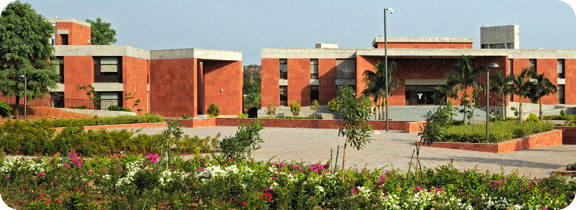
Tours of the Academy
There’s no better way to get a feel for the Academy and student life than to come and visit our campus!
We invite you to visit us on weekdays from 9.00 am–1.00 pm. Take a day to gather all the information you need, ask all your questions, explore the campus, and chat with the admissions team. If you would like to schedule a tour, please make a prior appointment by email or phone.
For more information, please contact the admissions office.
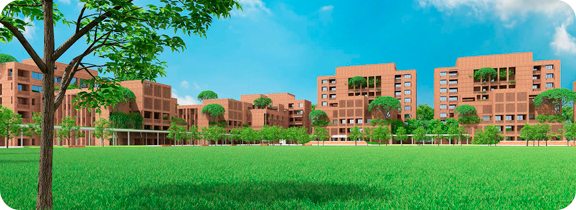
Tours of the Academy
There’s no better way to get a feel for the Academy and student life than by visiting us on one of our open days.
Take a couple of hours to gather all the information you need, ask all your questions, explore the campus, and chat with the admissions team. If you would like to schedule a tour, please make a prior appointment by email or phone.
For more information, please contact the admissions office.
The President's Award-Kenya
Two of Aga Khan Academy, Mombasa’s DP2 students Sumera Yego and Magdalena Gakuo have won The President's Award-Kenya (PA-K) this year.
Sumera and Magdalena were presented the award by President Uhuru Kenyatta at State House Nairobi on 07 October. The two AKA, Mombasa students have made us all proud by setting a new record of being the first candidates to have achieved the Gold level of the award programme online.
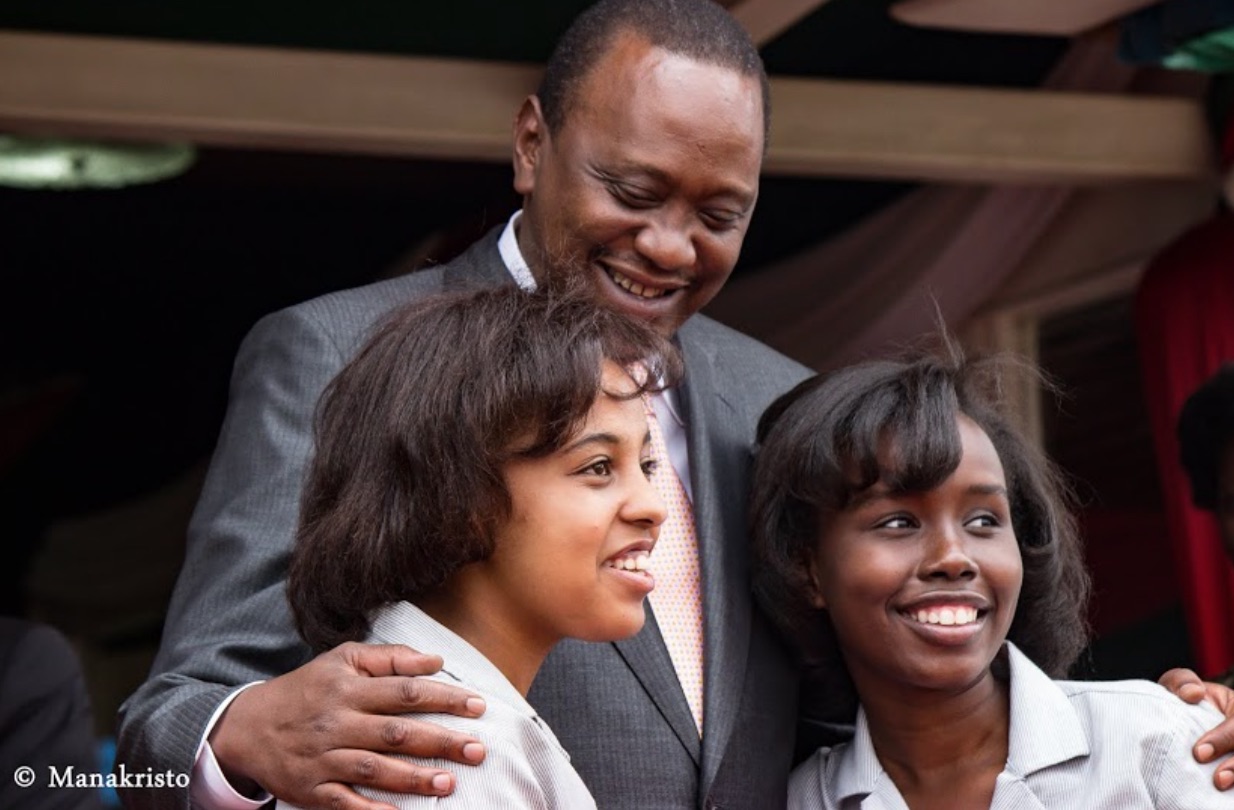
The Indian Express: Aga Khan Academy opens in Hyderabad
The Indian Express gives us a brief review of the official inauguration of The Aga Khan Academy, Hyderabad, an important event which included the presence of His Highness the Aga Khan as well as the Honourable Chief Minister N Kiram Kumar Reddu and the Honourable Union HRD Minister M M Pallam Raju.
Bilal Adamjee: Video spotlight
Meet Bilal, currently a student at the Aga Khan Academy Mombasa. For Bilal, studying at the Academy has instilled in him the value of learning whilst always thinking about the bigger picture: understanding how his studies today will impact the world tomorrow.
